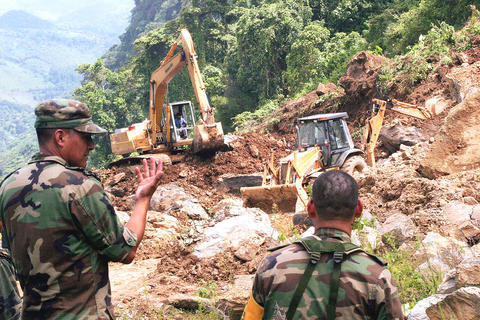As many as 60 people were feared to have died yesterday after a landslide swallowed a bus in Puebla state in central Mexico.
Emergency workers expressed little hope of recovering any survivors, as the army worked alongside them overnight at the sight of the accident to dig up the bus.
The first body, of a 40-year-old woman, was recovered by rescuers late on Wednesday more than 12 hours after the accident, Puebla Governor Mario Marin said.

PHOTO: AP
Though it took several hours for rescue operations to begin, more than 400 soldiers, firefighters and other rescue workers eventually arrived. By 8pm the bus had been located, according to Miguel Monterrubio, a spokesman for Mexican President Felipe Calderon.
The accident happened around 7:45am on a mountainous road between Tlacotepec de Porfirio Diaz and Zoquitlan in the Sierra Negra, a remote region of forested mountains at the juncture of the states of Puebla, Oaxaca and Veracruz.
Witnesses said 300m of the road was covered by large boulders and earth in a landslide that came after heavy rains the night before. The crush of earth pushed the bus off the road and nearly 150m down a ravine, where it disappeared under the mud, rocks and trees.
Most of the passengers were from small farm towns in the municipality of San Miguel Eloxochitlan and were on their way to the largest town in the area, Tehuacan, to market their goods and to pick up an annual agriculture subsidy from the government, people from the town said.
Rosario Trujillo, a town official, said the bus had been full as it left Tlacotepec 20 minutes before the tragedy. Local people rushed to try to reach and free the bus with shovels and sticks, but the police warned them off.
"The hill is still falling, and the authorities will not let us put more people in danger," she was quoted as saying by the daily Reforma.
Miguel Angel Rodriguez, a shopkeeper from a nearby village who tried to help, said: "Everyone is buried. People cannot dig because huge rocks keep falling down."
Six hours after the bus was buried, no ambulances or heavy equipment had arrived, said Eduardo Sedeno, a spokesman for the newspaper El Mundo in Tehuacan.
As the afternoon wore on, Calderon ordered the army and the Interior Ministry to help.
But it was not until 4pm that two earth movers arrived and began to excavate, said Jesus Portillo, a spokesman for the Puebla state civil protection agency.
Rains and other mudslides made it hard for heavy machinery to reach the site.
Carmen Garcia Montes, the Red Cross director in Tehuacan, said she sent two ambulances in the morning, but the paramedics had trouble reaching the site and could do little once they got there "because half the hill had slid down."
Relentless rain has arrived in recent days with the start of the annual rainy season, causing minor flooding and occasional mudslides in many parts of Mexico.

BOMBARDMENT: Moscow sent more than 440 drones and 32 missiles, Volodymyr Zelenskiy said, in ‘one of the most terrifying strikes’ on the capital in recent months A nighttime Russian missile and drone bombardment of Ukraine killed at least 15 people and injured 116 while they slept in their homes, local officials said yesterday, with the main barrage centering on the capital, Kyiv. Kyiv City Military Administration head Tymur Tkachenko said 14 people were killed and 99 were injured as explosions echoed across the city for hours during the night. The bombardment demolished a nine-story residential building, destroying dozens of apartments. Emergency workers were at the scene to rescue people from under the rubble. Russia flung more than 440 drones and 32 missiles at Ukraine, Ukrainian President Volodymyr Zelenskiy

COMPETITION: The US and Russia make up about 90 percent of the world stockpile and are adding new versions, while China’s nuclear force is steadily rising, SIPRI said Most of the world’s nuclear-armed states continued to modernize their arsenals last year, setting the stage for a new nuclear arms race, the Stockholm International Peace Research Institute (SIPRI) said yesterday. Nuclear powers including the US and Russia — which account for about 90 percent of the world’s stockpile — had spent time last year “upgrading existing weapons and adding newer versions,” researchers said. Since the end of the Cold War, old warheads have generally been dismantled quicker than new ones have been deployed, resulting in a decrease in the overall number of warheads. However, SIPRI said that the trend was likely

‘SHORTSIGHTED’: Using aid as leverage is punitive, would not be regarded well among Pacific Island nations and would further open the door for China, an academic said New Zealand has suspended millions of dollars in budget funding to the Cook Islands, it said yesterday, as the relationship between the two constitutionally linked countries continues to deteriorate amid the island group’s deepening ties with China. A spokesperson for New Zealand Minister of Foreign Affairs Winston Peters said in a statement that New Zealand early this month decided to suspend payment of NZ$18.2 million (US$11 million) in core sector support funding for this year and next year as it “relies on a high trust bilateral relationship.” New Zealand and Australia have become increasingly cautious about China’s growing presence in the Pacific

Indonesia’s Mount Lewotobi Laki-Laki yesterday erupted again with giant ash and smoke plumes after forcing evacuations of villages and flight cancelations, including to and from the resort island of Bali. Several eruptions sent ash up to 5km into the sky on Tuesday evening to yesterday afternoon. An eruption on Tuesday afternoon sent thick, gray clouds 10km into the sky that expanded into a mushroom-shaped ash cloud visible as much as 150km kilometers away. The eruption alert was raised on Tuesday to the highest level and the danger zone where people are recommended to leave was expanded to 8km from the crater. Officers also